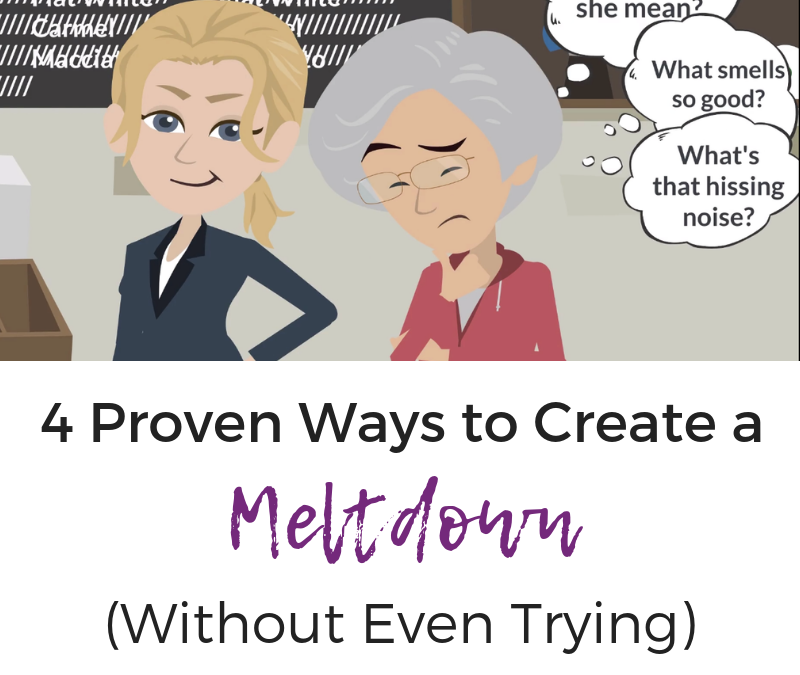Meltdowns aren’t pleasant. No one—you, your person, people within 50 feet—wants to be involved. Too often, it feels like these not-so-magic moments sneak up on us without any warning. And sometimes, as with the first two instances below, that’s true.
Much of the time, though, you can see it coming if you know what to watch for. Here are four proven ways to create a meltdown (without even trying).
Proven Way #1: The Unexpected=Out of Proportion Reaction
Sometimes, you just can’t see it coming.
Last week, I had just started broadcasting live (Module 3: Avoiding Holiday Meltdowns—the irony!) when someone knocked on my front door. My three dogs, usually sleeping bums that time of day, woke up with an extra shot of adrenaline.
I kept talking into the camera as my dogs barked, hoping my voice would soothe them, mindful of my responsibility to people enrolled in the course, and wishing I’d remembered to turn on the sonic egg before I started. (When provoked, the egg emits a sound only the dogs can hear and is remarkably effective in getting even worked up dogs to zip it in the space of a few seconds.)
It appeared we were headed back to quiet when another knock landed.
Now it was on and crackin.’ The dogs were fully alert, certain a threat lurked on the other side of the door. Even a sonic boom couldn’t have stopped them. After saying I’d be right back, I abruptly ended the broadcast.
Back on within five minutes or so, I was still a little rattled when I restarted. Because we’re talking dogs here, this isn’t a perfect comparison. Still, I couldn’t help but notice the dogs were over it much more quickly than I was. Which leads me to proven way to a meltdown #2.
Proven Way #2: The Flashback=Lingering Upset
My adrenaline had spiked right along with the dogs’. Was there a nefarious stranger on my front porch? Someone hiding in the bushes?
It took me back to when I was a little girl, about 4 years old. My sister (2 at the time) and I were playing in the living room while our mother was watching The Mike Douglas Show when, beyond the tv, a figure caught her attention. A man was standing on the back patio, trying to get in the sliding glass door.
We were directed to get under our beds immediately, not make a noise, and not come out until she said we could.
“Getting triggered” is a real thing, and it has nothing to do with being a snowflake. I’m not shocked anymore by the number of folks (of both genders) I’ve worked with who’ve survived sexual assault, but you might be.
Because of the age of the population I work with most often (and the era they grew up in), many (most?) survivors didn’t talk about the experience contemporaneously, certainly not with their children. So it can come as a surprise later when a memory’s been triggered and the person doesn’t have the coping skills or mechanisms to manage it anymore.
Proven Way #3: The Too-Long Experience=Meltdown
Yesterday, Michael and I took our granddaughters to a “Breakfast with Santa” Christmas party. This is the third year in a row we’ve taken the older one, but the first time we’ve brought the younger one, too. #LearningCurve
After about 45 minutes in the car, we arrived to what’s become a favorite holiday tradition. The girls navigated through a bonzo turnout to take pictures with Santa, make ornaments, get their faces painted, and load up on hot chocolate and donut holes. An hour and a half later, we were headed out when we were waylaid by friends heading in.
After a quick errand to the bank, we headed back toward home. We ran into construction on the freeway, almost doubling the time it would usually take to get back home.
By this time, it was clear we’d need to stop for lunch before we returned the girls home. Inside the burger joint, the youngest hollered it was the wrong burger joint, zipped away from us in line, slid into another patron’s booth and started drinking from his soda.
It got worse from there.
I thought about how this would be different if she was 80 years older, with dementia. My best guess is she would’ve been too afraid of a broken hip to have thrown herself to the ground.
Otherwise, I think it was roughly parallel.
Disinhibition with strangers? Check.
Poor safety awareness? Check.
Angry at being redirected? Check.
Inability in the moment to self-soothe? Check.
Inability in the moment to hear others (ie, “The voice of reason”)? Check.
Totally predictable outcome after doing too many things outside the normal routine (and taking way too long to do all those things)? Check!
Proven Way #4: The Too Much Experience=Overwhelm
My friend Sande, who made the video on the DementiaSherpa.com homepage offering the Communication Tips & Strategies for Dementia Care Partners guide, recently made me a new video.
This new video makes the same offer, but that’s not what I want you to notice. Instead, focus on the trip to Starbucks. Turn on your speakers and really get the full experience.
Do you get a sense of how easy it is for a meltdown to happen? There was way too much going on at the same time for the woman to process. Of course she got overwhelmed, especially when she was feeling pressured to order.
Looking at the various ways we can easily fall into a meltdown situation, it’s kind of a miracle they don’t happen more often isn’t it?
Proven Ways to Make it Better (Before or After a Meltdown)
- There’s not much you can do when something you didn’t see coming happens, except be as understanding and soothing as possible after it’s happened.
- Cut down the length of time you spend on each excursion. Check in with your person in more frequent intervals.
- Stick to places and experiences that don’t cause overstimulation and confusion.
- Keep your expectations realistic. If your person’s just been startled or had a flashback, they can use all the Good Stuff you’ve got. So bring the Good Stuff with bells on!
It can be tough to keep in mind during a meltdown, but worth remembering: your person wants to have a good time at least as much as you do. They just need a little assist sometimes.


